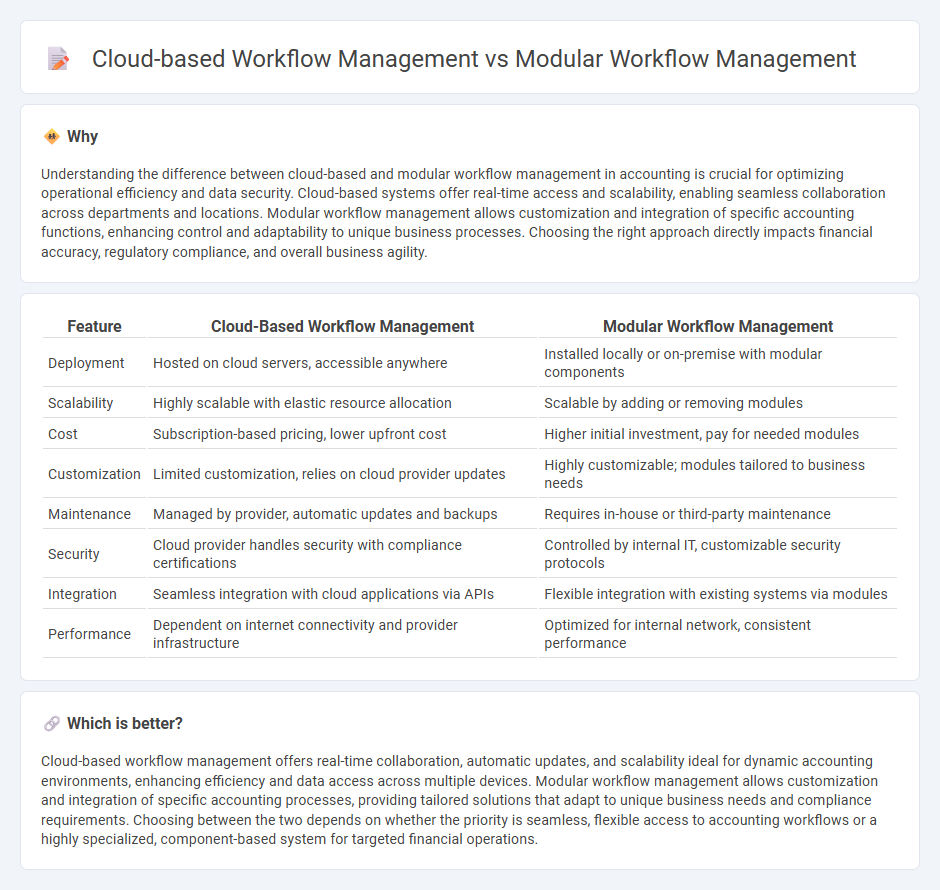
Cloud-based workflow management utilizes internet-hosted platforms to streamline accounting processes, offering real-time data access, automated task assignments, and seamless collaboration across teams. Modular workflow management breaks down accounting functions into discrete, customizable modules, allowing organizations to tailor workflows to specific financial operations such as invoicing, expense tracking, and audit preparation. Explore how these innovative systems can transform your accounting efficiency and accuracy.
Why it is important
Understanding the difference between cloud-based and modular workflow management in accounting is crucial for optimizing operational efficiency and data security. Cloud-based systems offer real-time access and scalability, enabling seamless collaboration across departments and locations. Modular workflow management allows customization and integration of specific accounting functions, enhancing control and adaptability to unique business processes. Choosing the right approach directly impacts financial accuracy, regulatory compliance, and overall business agility.
Comparison Table
| Feature | Cloud-Based Workflow Management | Modular Workflow Management |
|---|---|---|
| Deployment | Hosted on cloud servers, accessible anywhere | Installed locally or on-premise with modular components |
| Scalability | Highly scalable with elastic resource allocation | Scalable by adding or removing modules |
| Cost | Subscription-based pricing, lower upfront cost | Higher initial investment, pay for needed modules |
| Customization | Limited customization, relies on cloud provider updates | Highly customizable; modules tailored to business needs |
| Maintenance | Managed by provider, automatic updates and backups | Requires in-house or third-party maintenance |
| Security | Cloud provider handles security with compliance certifications | Controlled by internal IT, customizable security protocols |
| Integration | Seamless integration with cloud applications via APIs | Flexible integration with existing systems via modules |
| Performance | Dependent on internet connectivity and provider infrastructure | Optimized for internal network, consistent performance |
Which is better?
Cloud-based workflow management offers real-time collaboration, automatic updates, and scalability ideal for dynamic accounting environments, enhancing efficiency and data access across multiple devices. Modular workflow management allows customization and integration of specific accounting processes, providing tailored solutions that adapt to unique business needs and compliance requirements. Choosing between the two depends on whether the priority is seamless, flexible access to accounting workflows or a highly specialized, component-based system for targeted financial operations.
Connection
Cloud-based workflow management enhances accounting processes by enabling real-time collaboration and seamless access to financial data across multiple modules. Modular workflow management structures accounting tasks into customizable, independent units that integrate smoothly within cloud platforms, improving efficiency and scalability. This connection allows accounting firms to optimize workflows, reduce errors, and maintain regulatory compliance through automated, flexible solutions.
Key Terms
Integration
Modular workflow management systems offer flexible integration by allowing users to customize and add specific components tailored to unique business needs, enhancing interoperability with existing on-premise tools. Cloud-based workflow management platforms provide seamless integration across diverse software and services through APIs and standardized connectors, supporting real-time collaboration and scalability. Explore detailed comparisons to understand which integration approach best suits your operational goals.
Scalability
Modular workflow management systems enable scalability through customizable components that can be independently updated and expanded to meet evolving business needs, while cloud-based workflow management leverages elastic cloud infrastructure to dynamically allocate resources and handle fluctuating workloads. The modular approach provides granular control over scalability, allowing organizations to build tailored solutions, whereas cloud-based solutions offer seamless scalability with minimal maintenance and broad accessibility. Explore more to understand which workflow management system best fits your scalability requirements.
Data Security
Modular workflow management offers granular control over data security by enabling organizations to customize and isolate specific workflow components, reducing the risk of unauthorized access. Cloud-based workflow management provides scalable security measures such as encryption, multi-factor authentication, and compliance with standards like ISO 27001 and GDPR, but may introduce concerns over data sovereignty and vendor lock-in. Explore how each approach aligns with your organization's data protection requirements and risk tolerance for optimal security.
Source and External Links
Scaling Large Workflows Part 1: Embracing a Modular ... - Embracing a modular structure in workflow management enhances scalability, simplifies maintenance, and provides flexibility to adapt to changing business needs by breaking down processes into isolated, easily adjustable components.
Designing Modular Data Workflows - by Ergest Xheblati - Applying modularity to data workflows means designing each module to be independent and single-responsibility, isolating changes and enabling easier building, testing, and maintenance by separate teams.
The Ultimate Guide to Creating a Scalable Workflow ... - Modular design in workflow management allows organizations to add, remove, or rearrange features without disrupting existing processes, supporting adaptability and long-term scalability.
 dowidth.com
dowidth.com